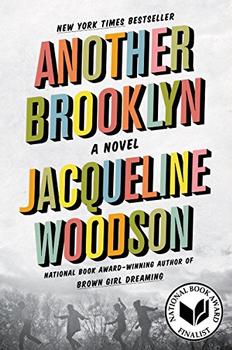Summary | Excerpt | Reviews | Beyond the book | Read-Alikes | Genres & Themes | Author Bio

A Novel
by Jacqueline WoodsonThere's a trend this year of award-winning writers for young people – like Robin Wasserman, Gayle Forman, and Meg Rosoff – publishing significant literary fiction for an adult audience. Now acclaimed young adult author Jacqueline Woodson joins those ranks. Woodson, who won the 2014 National Book Award (among many other accolades) for her memoir-in-verse Brown Girl Dreaming, again explores themes of coming of age in her new novel.
The title Another Brooklyn might evoke contemporary real-estate pitches about up-and-coming urban environments (e.g., "Boise, Idaho, is poised to become another Brooklyn"), but in Woodson's novel set in the 1970s, "Brooklyn," particularly its working-class Bushwick neighborhood, means something much different and more complicated: "I watched my brother watch the world, his sharp, too serious brow furrowing down in both angst and wonder. Everywhere we looked, we saw the people trying to dream themselves out. As though there was someplace other than this place. As though there was another Brooklyn." For teen-aged August, as well as her friends and family, Brooklyn is a landscape to be traversed warily, a territory rife with dangers, a place from which to escape, or at least try to.
Like many of their neighbors, August and her family are relative newcomers to Brooklyn. August moves there with her father and younger brother from a romanticized place they call SweetGrove, Tennessee. August continually reassures her brother that their mother, who had become increasingly unbalanced after their uncle's death in Vietnam, will return to them any day now. But their mother never arrives, and despite memories of her mother's exhortations to "keep women a whole other hand away from the farthest tips of your fingernails," August finds herself longing for the friendship of other girls, particularly the tight-knit relationship of three in the neighborhood: Gigi, Angela, and Sylvia.
After some initial shyness on August's part, the four become inseparable: "four girls together, amazingly beautiful and terrifyingly alone." As they travel from childhood into adolescence, they must navigate an environment in which their hopes and aspirations are continually under threat by poverty's hindrances, by men's (often unwanted) attention and expectations, and by society's assumptions about their curtailed potential.
Another Brooklyn is a novel told in retrospect. August's recollections of her adolescence – not all of them welcome – are prompted by a return visit she makes to Brooklyn as an adult, during her father's terminal illness. On the way home from the funeral, she spots Sylvia on the train, and immediately the two decades since she's last seen her friend melt away, flooding August with a rush of memories. "This is memory," she repeats again and again throughout her narrative, continually reminding readers of both the power and fallibility of human recollection and understanding.
Perhaps unsurprisingly, given Woodson's background not only as a novelist but also as a poet, Another Brooklyn is told in spare, lyrical prose, with a surface simplicity that belies its underlying narrative strength and emotional heft. Often, in Woodson's novel, what isn't said is as essential as what is, and readers come away feeling as if they, in the process of reading the novel, are somehow partners in Woodson's project of telling her poignant and devastating story about dreams deferred, destroyed, and – in rare cases – realized.
![]() This review was originally published in The BookBrowse Review in August 2016, and has been updated for the
May 2017 edition.
Click here to go to this issue.
This review was originally published in The BookBrowse Review in August 2016, and has been updated for the
May 2017 edition.
Click here to go to this issue.

If you liked Another Brooklyn, try these:

by Mia McKenzie
Published 2025
In this vibrant, gratifying novel, a pious, small-town teenager travels to Atlanta to get an abortion and finds herself smack in the middle of the civil rights movement and the secret lives of queer Black people.

by Krystal Marquis
Published 2024
The first in a breathless YA series set in 1910 Chicago, The Davenports offers a glimpse into a period of African American history often overlooked, while delivering a totally escapist, swoon-worthy read
The truth does not change according to our ability to stomach it
Click Here to find out who said this, as well as discovering other famous literary quotes!
Your guide toexceptional books
BookBrowse seeks out and recommends the best in contemporary fiction and nonfiction—books that not only engage and entertain but also deepen our understanding of ourselves and the world around us.